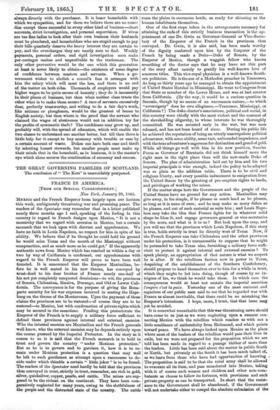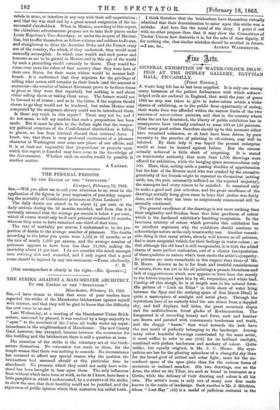FRANCE IN AMERICA.
[FROM OUR SPECIAL CORRESPONDENT.] New York, January 28, 1865. Mimic° and the French Emperor loom largely upon our horizon this week, ambiguously threatening war and promising peace. The readers of the Spectator may remember that ia a letter published nearly three months ago I said, speaking of the feeling In this .country in regard to French designs upon Mexico, "It is not a monarchy that we regard with aversion in, Mexico, but a certain monarch that we look upon with distrust and apprehension. We have no faith in Louis Napoleon, no respect for him in spite of his ability. We believe that if he thought he could hold his ground he would seize Texas and the mouth of the Mississippi without compunction, and as much more as he could get." If the apparently authentic news from Mexico which has reached us within a. day or two by way of California is confirmed, our apprehensions with regard to the. French Emperor will prove to have been well founded. It is announced that the Emperor Maximilian, be- fore he is well seated in his new throne, has conveyed by trust-deed to his dear brother of France nearly one-half of- his not yet completely conquered dominions—to wit, the provinces of Sonora, Chihuahua, Sinalva, Durango, and Old or Lower Cali- fornia. The conveyance is for the purpose of giving the. Bona- parte security for his war expenses incurred in seating the Haps- burg on the throne of the Montezumas. Upon the payment of those claims the provinces are to be restored—of course they are to be restored—to Mexico, but with confirmation of private rights which may be secured in the meantime. Fending this protectorate the Emperor of the French is to supply a military force sufficient to defend these provinces against internal and external. enemies. Who the internal enemies are Maximilian and the French generals well know, who the external enemies may be depends entirely upon the course pursued by the Imperial Protector. In the story as it tomes to us it is said that the French monarch is to hold in trust and govern the country " under Mexican protection." But as he is to govern and to garrison. it, how it is to re. main under Mexican protection is a question that may well be left to such gentlemen as attempt upon a racecourse to de-. tide under which thimble a certain " little joker " is to be found. The readers of the Spectator need hardly be told that the provinces thus conveyed in trust, strictly in trust, remember, are rich in gold, *silver, quicksilver, copper, pearls, and cattle. The mines are sup- posed to be the richest on the continent. They have been coin- paratively neglected for many years, owing to the slothfulness of the people and the distracted state of the country. The cattle roam the plains in enormous herds, as ready for skinning as the human inhabitants themselves.
One of the first steps taken in the arrangements necessary for attaining the ends of this strictly business transaction is the ap- pointment of one Dr. Gwin as Governor-General or Vice-Secre- tary of the Emperor of the French in the provinces thus conveyed. Dr. Gwin, it is also said, has been made worthy of the dignity conferred upon him by the Emperor of the French by being made a Duke—Duke of Sonora, by the Emperor of Mexico, though a waggish fellow who knows something of the doctor says that he may have set this part of the story afloat merely, to gratify his well-known love of sonorous titles. This vice-royal physician is a well-known South- ern politician. Ile is the son of a Methodist preacher in Tennessee. As long as thirty years ago he managed to obtain the appointment of United States Marshal in Mississippi. He went to Congress from that State as member of the Lower House, and was at last senator from California. (By the way, it would be a curious question in Secessia, though by no means of an uncommon nature,—to which "sovereignty" does he owe allegiance,—Tennessee, Mississippi, or California ? ) The duke-doctor's associations, political and social, in this country were chiefly with the most violent and the coarsest of the slavebolding oligarchy, to whose interests he was thoroughly committed. He was arrested early in the war, but was soon released, and has not been heard of since. During his public life he achieved the reputation of being an utterly unscrupulous political adventurer, with some ability, some tact, unbounded impudence, and with the true adventurer's eagerness for distinction and greed of gold. While all things go well with him in his new position, Sancho Panza as Governor of Barataria did not think himself more the right man in the right place than will the new-made Duke of Sonora. The plan of administration laid out by him and his two imperial principals is wise enough, indeed the policy to be adopted was as plain as the addition. table.. There is to be civil and religious liberty, and every possible inducement to emigration from the United States by the granting of pre-emption rights to lands, and privileges of working the mines.
If the matter stops here the Government and the people of the United States have no ground for any action Maximilian may give away, in fee simple, if he pleases as much land as he pleases, so long as it is none of ours ; and he may make as many dukes as he pleases, and out of such material as suits him ; and Louis Napo- leon may take the idea that France fights for in whatever solid shape he likes it, and engage governors-general or vice-secretaries by the score, and what is it to us ? But look upon the map, and you will see that the provinces which Louis Napoleon, if this story is true, holds strictly in trust lie directly west of Texas. Now, if the French Emperor can take Chihuahua and the other provinces under his protection, is it unreasonable to suppose that he might be persuaded to take Texas also, furnishing a military force suffi- cient to protect it against internal and external enemies ? To speak plainly, an appropriation of that nature is what we suspect he is after. If the rebellious faction now in power in Texas, despairing of the establishment of the Southern Confederacy, should propose to hand themselves over to him for a while in trust, which they might be led into doing, though of course by no in- trigues of his, we think he would take them. In which case the consequences would at least not sustain the imperial assertion rewire c'est la pair. Yesterday one of the most eminent and sagacious of our public men said to me that he regarded war with
France as almost inevitable, that there could be no mistaking the Emperor's intentions. I hope, more, I trust, that that issue nag yet be avoided.
It is somewhat remarkable that this war-threatening news should have come to us just as we were cogitating upon a rumour con- necting Mexico with the rebellion which reaches us with not a little semblance of authenticity from Richmond, and which points toward peace. We have always looked upon Mexico as the place where most of the leaders of the rebellion would pass their lives in exile, but we were not prepared for the proposition which we are told has been made in regard to a passage thither of more than the leaders. Little has been said about the matter in public South or North, but privately at the South it has been much talked of, as we learn from those who have had opportunities of knowing .
The proposition is said to be that the rebel army shall be allowed to evacuate all its lines, and pass unmolested into Mexico, taking with it of course such women and children and other non-com- batants as choose to follow its fortunes, with provisions and such private property as can be transported. In short that the. resist- ance to the Government shall be abandoned, if the Government will, not undertake either to compel the absolute submission of the
rebels in arms, or interfere in any way with their self-expatriation ; and that the war shall end by a great armed emigration of the un- successful slaveholders. When in Mexico,- according to this report, the chivalrous adventurerers propose not to take their places under Louis Napoleon's Vice-Secretary, or under the sceptre of Maximi- lian, but to offer themselves as fellow-citizens and soldiers to Juarez, and straightway to drive the Austrian Duke and the French army out of the country, the which, if they undertook, they would most assuredly accomplish. In which case wealth and such power and honours as are to be gained in Mexico and in this age of the world by such a proceeding would certainly be theirs. They would be- come even more the rulers of that country than they were here of their own States, for their mean whites would be meaner half- breeds. It is understood that they stipulate for the privilege of selling what gotton still remains in their hands (and the amount is enormous—the number of bales at Savannah prove to be three times as great as they were first reported), but nothing is said about either selling slaves or taking them away. The former would not be listened to of course ; and as to the latter, if the negroes should choose to go they would not be hindered, but unless Mexico were conquered by the emigrants slavery could not be introduced there.
Is there any truth in this report? There may not be, and I do not mean to tell my readers that such a proposition has been made. But it must be plain to the dullest sight that the tempor- ary political structure of the Confederated slaveholders is falling to pieces, no less from internal discord than external force. I know, too, that there is very profound excitement of a pleasant character at Washington over some new phase of our affairs, and it is at least not impossible that propositions or projects upon which this report is founded may have come to the knowledge of the Government. Whether such an exodus would be possible is another matter.
A YANKEE.































 Previous page
Previous page